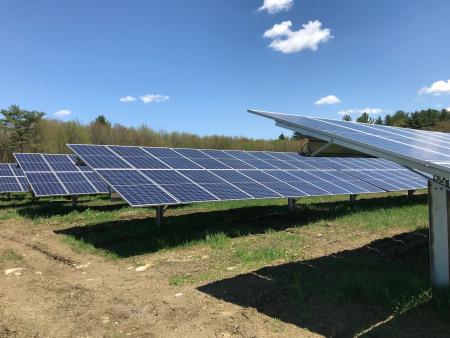Solar power is one step closer to serving rural Massachusetts.
The University of Massachusetts’ Clean Energy Extension will work with three Western Massachusetts communities--Blandford, Wendell and Westhampton--to develop plans for siting solar panels, in a project funded by a grant from the federal Department of Energy’s National Renewable Energy Laboratory. The project is intended to create a replicable model for rural communities in New England and New York. It will demonstrate how solar siting processes in rural communities can be driven by the residents themselves, and how they can work with public officials to keep the benefits of solar power in their own communities.
What Problems Does This Project Aim to Solve?
Sometimes the competing goals of solar developers, local planners, and community residents can lead to friction during the development process, often leading to increased costs. This demonstration project will instead work to bring rural residents and their public officials together in a proactive planning process. Together, they will identify preferred sites for solar development, prepare for local ownership, and identify financing opportunities. This shift in control will enable rural communities to better understand and control their solar development options. The project will serve to reduce solar costs through streamlining the permitting process, and by employing local capital and financing.
Meeting Greenhouse Gas Reduction Commitments
Despite significant successes, Massachusetts faces continuing challenges in meeting its greenhouse gas reduction commitments, while maintaining reasonable electricity rates and ensuring proper solar siting. Solar development on natural and agricultural lands in rural areas has provoked community resistance to large-scale solar projects, leading to moratoriums, bylaw changes, litigation, and an uncertain permitting environment detrimental both to solar development and local municipalities. The team for this project – which includes state and regional planning agencies, municipalities, locally-based solar developers, and financers – will develop a solar siting and financing model for rural communities that may help alleviate this type of resistance in rural communities.
Project leader Dwayne Breger, director of Clean Energy Extension and extension professor of environmental conservation, believes that this project is well-timed. He said, “This effort will help to put the state’s communities and citizens in a strong position to determine where new projects are best located according to their specific needs and goals.”
Over the coming decades, a rapid and sustained pace of solar development will be needed across the United States to meet greenhouse gas reduction and renewable energy targets. The pace of development will not be possible without the continuing support of rural residents. This project will result in a set of planning tools that can be implemented to ensure that solar projects are well-sited, aligned with the preferences of local communities, and providing economic returns to those communities.
In addition to Clean Energy Extension, the project team includes UMass Department of Environmental Conservation; Massachusetts Clean Energy Center; Massachusetts Department of Energy Resources; Massachusetts Department of Agricultural Resources; Pioneer Valley Planning Commission; Franklin Regional Council of Governments; Western Massachusetts Community Choice Energy Task Force; UMassFive College Credit Union; Northeast Solar; PV Squared; Co-op Power; and the Towns of Blandford, Wendell, and Westhampton
